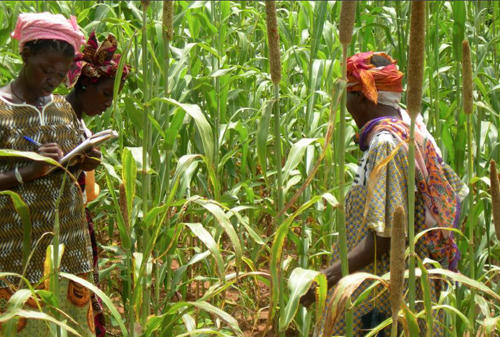Farmer-selected local varieties certified in Mali

Celebrate with us the recent seed certification of eight local crop varieties produced by farmers in Mali, made possible by the work of Bioversity International and partners through seed fairs and Diversity Field Fora.
This June, farmers in Mali have achieved a key milestone. Seeds of eight varieties of cowpea, fonio, millet and sorghum produced by farmers have now been certified by Mali’s national seed laboratory – Laboratoire National des Semences (LABOSEM).
This is a significant step for Mali, where the trade of uncertified seeds is technically illegal, even though 92-99% of seed demand is supplied by the informal sector, i.e. farmers and their neighbours. Sometimes, informal exchange is the only option, as improved varieties do not always exist for important local crops such as Bambara groundnut. But certification of local seed varieties is difficult for farmers, mostly due to administrative barriers or limited capacity to produce varieties that meet the quality standards required for certification.
With that premise, Bioversity International has been working with partners in Mali since 1999 to encourage farmers to experiment and evaluate different varieties of local crops, strengthen the dialogue and support between the formal and informal seed sectors, and train farmers in quality seed production of varieties that are better adapted to local conditions. The training has certainly paid off – around 90% of the seed samples (1,937kg) submitted to LABOSEM by farmers in 2014 with help from the Genetic Resources Unit of Mali’s Rural Economics Institute (IER-URG), were certified as good quality seeds. These farmers can now legally sell their varieties to others.
To reach this stage, Bioversity International and partners have been working with farmers through Diversity Field Fora (DFF), seed fairs and community seed banks. Diversity Field Fora are experimental farm plots and meetings that allow farmers, extension agents and researchers to come together, exchange ideas, and evaluate the performance of different crop varieties. Knowledge about both local and improved varieties is mostly shared through diversity kits, which contain varieties gathered by farmers and researchers from different regions of the country. From the kits, farmers choose the varieties that they prefer to plant in the experimental plots. All varieties are evaluated with a set of criteria based on farmers' preferences. Those that perform well are then selected, multiplied and disseminated within and beyond the group. It is worth noting that men and women often choose varieties for different reasons. While men often select varieties based on yield quantity and market demand, women often choose those that cook better and are easier to process after harvest.
Mali is one of the most successful countries of the initiative, which also took place in Burkina Faso, Niger and earlier in Zimbabwe. Some farmers have formed their own seed production groups and set up community seedbanks to store local varieties. Farming techniques have also improved as the DFF provide opportunities to test, compare and improve on things such as seed treatment and soil and water management. Several villages in Mali have continued to maintain DFF without external financial support, and local leaders from some villages have decided to integrate the approach into their local development plans.
Most importantly, initiatives such as these increase farmer knowledge about available agricultural biodiversity and how to benefit from its use. They also reinforce the right of farmers to produce and provide quality seeds for themselves, strengthen the national seed system and help integrate formal and informal seed sectors.
The above work refers to the Bioversity International-led projects: 'Empowering Sahelian farmers to leverage their crop diversity assets for enhanced livelihood strategies' and 'Reducing the risk of crop failure for poor farmers through enhancing traditional seed systems in Sahelian West Africa', both supported by the International Fund for Agricultural Development (IFAD).
Read more about the impact of Diversity Field Fora
Photo: Diversity Field Forum in Mali. Credit: Bioversity International/R.Vodouhe
This story is part of the 2014 Annual Report
